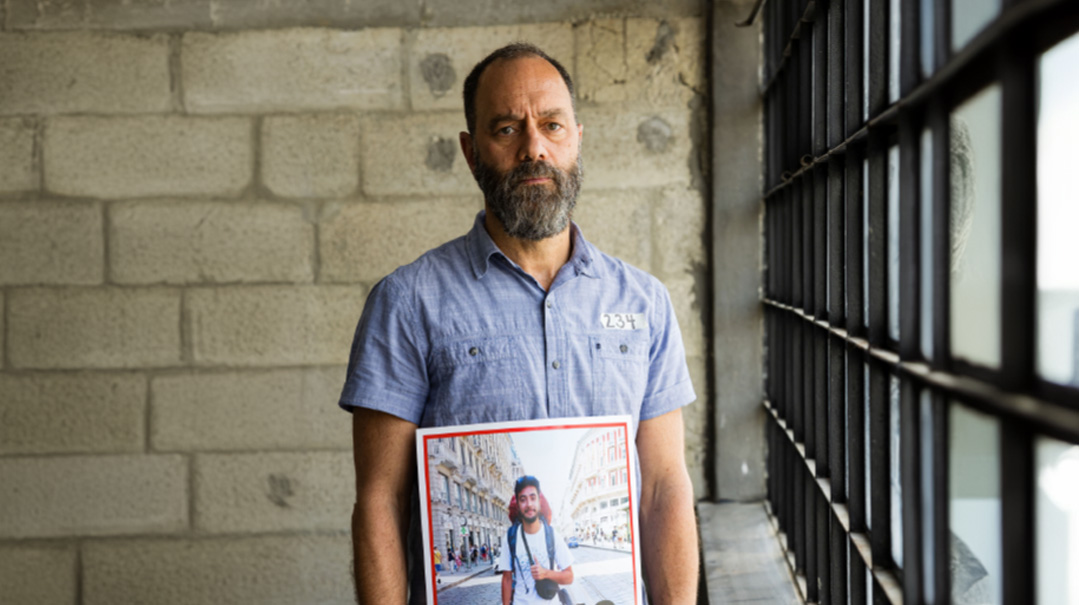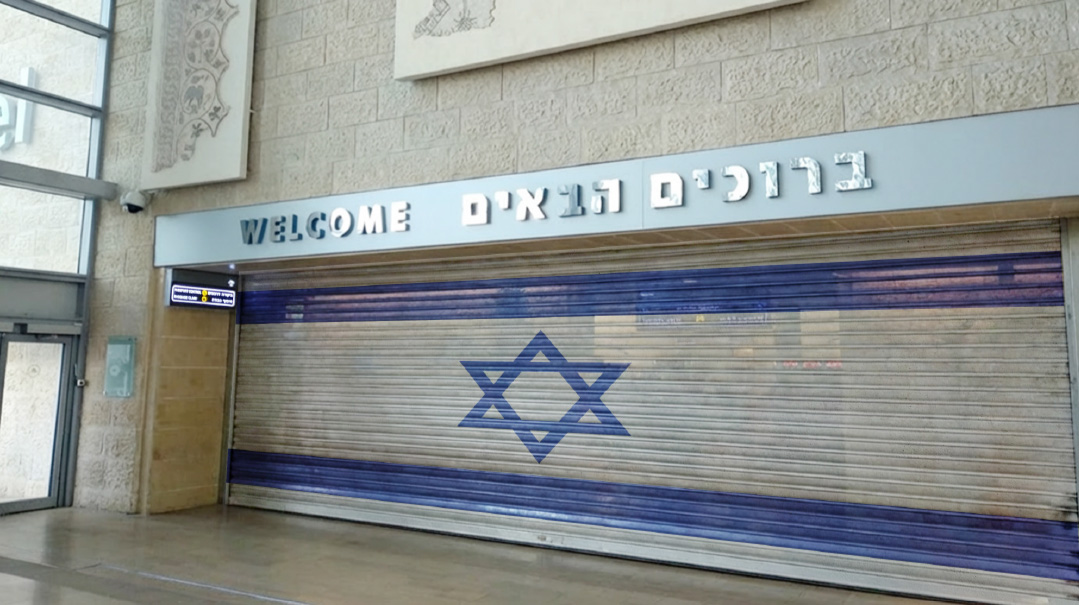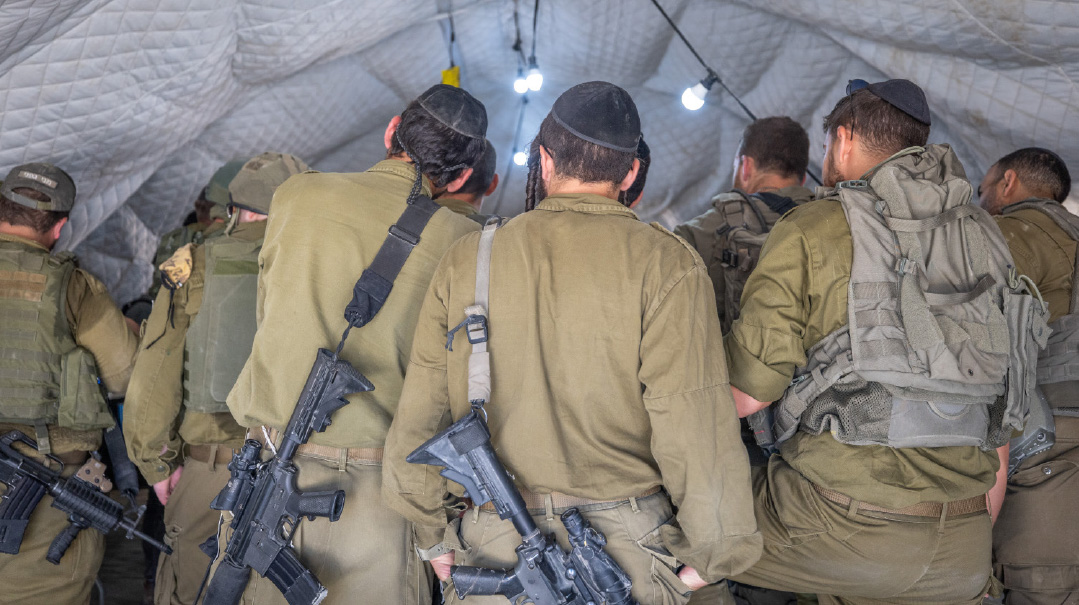Hersh’s Gift

That greatness of spirit that was summoned forth by his parents is Hersh’s gift to us all

Photo: Elchanan Kotler
I
’ve been sitting next to my computer all day, and still the words refuse to come. Early on this black Sunday, news of the brutal murder of six hostages filtered out. Ori Danino, Eden Yerushalmi, Carmel Gat, Alex Lubanov, Almog Sarusi — and one of the best-known captives, Hersh Goldberg-Polin — may Hashem avenge their blood, murdered at point-blank range by the ghouls who’d held them captive.
What horrors had they endured in their last moments? How could they die after a year’s worth of prayers? How will their families cope with the enormity of this tragedy? When all you feel is fearful questions and incoherent emotions, words seem like pitiful, even ridiculous things — a mockery of the shapeless churning inside.
And yet, I feel compelled to say something, because less than three months ago, I sat with Jon and Rachel Goldberg-Polin for an interview that was equal parts harrowing and inspiring. Of all the millions of Jews worldwide who prayed for the captives and kept their families in mind, I had a window into their world that few others did.
Over the course of 90 minutes, you can tell a lot about people — especially when they’re living on the emotional edge. What I witnessed was the unfiltered, raw reality of a couple suddenly handed a stark choice: Sink into the morass of despair, or grasp for greatness. Jon and Rachel chose the latter, and in the process, taught us all a series of lessons that should reverberate across time, and be an illui neshamah for Hersh himself.
The meaning of faith is the first. Rachel Goldberg-Polin was convinced that Hersh was coming home. Given the pitiless nature of Hersh’s captors, that wasn’t a logical thought — it was one borne aloft on the wings of emunah.
Behind the door in their home, the Polins had a large picture of their son hanging that became part of Rachel’s daily tefillah. During Baruch She’amar, she would repeat “podeh u’matzil,” multiple times. When she said “somech noflim” in Shemoneh Esreh, she looked at Hersh’s poster, and at “v’rofei cholim,” she looked at her own left arm, where Hersh’s arm was amputated, and continued, “u’matir asurim, u’matir asurim, u’matir asurim.”
That faith found expression in the little davening room that Rachel had in the Jerusalem office space that the “Bring Hersh Home” effort rented, where she’d head “to scream out a few Tehillim or just talk to Hashem.”
That faith is what gave Rachel and Jon the strength to campaign for his release and that of all the other hostages, in a shuttle diplomacy effort at the top of world politics.
How do Jews sustained by their belief behave when the worst comes to pass? That, too, is what Jon and Rachel are now teaching us. Like a latter-day Akeidah, the faith that endured a year of unimaginable suffering is now being tested with the ultimate trial, now that Hashem has asked for Hersh back.
For anyone who followed the Polins’ extraordinary campaign, their dignity — a certain innate nobility of bearing and expression — was a second lesson. Jon and Rachel’s campaign took them to many of the world’s biggest power brokers, and wherever they went, they left a kiddush Hashem.
Nobody would have faulted them for giving in to the pressure and grief, and lashing out at leaders who were doing too little to bring Hersh home, or joining the chorus of left-versus-right politics that poisoned the hostage release effort. And yet they did none of that. Aware of their own outsized influence, they highlighted the plight of all the hostages, vowing to continue campaigning even after Hersh was free. Week after week, they advocated, lobbied, stormed the gates of the world media and foreign chancelleries with a rare poise and humanity.
“Just imagine that this was your son and daughter,” they told interviewers, politicians, or potential influencers, pointing to the masking tape that they both wore bearing the number of days that Hersh had been in captivity. It was both highly strategic — gaining them entrée in a world that had long turned against Israel — but also an expression of a Jewish dignity that knew how to be forceful while remaining elevated above mud-slinging and factionalism of all types.
And then there was a lesson in the power of unconditional love. Despite going on his own journey over the last few years, Hersh demonstrated an extraordinary kibbud av va’eim by scrupulously adhering to frum practice when he was at home. He left soccer games early on Friday to join his family for Kiddush, sat in a Succah even where his parents were out, and continued coming to shul so that his father wouldn’t be alone.
That dedication to his parents was what convinced Rachel that Hersh would be coming home. “It’s in the Aseres Hadibros, that the reward for kabeid es avicha is a long life,” she told me. “He has a long life to live, because he showed respect for us even when he wasn’t living the life that we live.”
What was the source of Hersh’s unusual respect and dedication to his parents’ feelings? Where did he learn that from?
The answer is probably: right at home. Perhaps it was his parents’ incredible dedication to him — their unconditional love that held him tight even as he struggled with his identity, and that found its expression in their superhuman dedication to his release — that was mirrored by Hersh’s own behavior.
“We all live with a slow-motion trauma, on a different planet than the rest of humanity,” Rachel told me back in June. “It’s like Yaakov Avinu who couldn’t find comfort because Yosef was in fact alive.”
With the dreaded news today, that suspense — horrible, yet hopeful — is now over, and a new chapter of grief begins.
In the year they spent in that terrifying in-between land, Jon and Rachel left us the gift of inspiration, of seeing Jews fortified by visceral faith, dignity, and the healing power of love.
As they move forward with a life without Hersh, that greatness of spirit that was summoned forth by his parents is Hersh’s gift to us all.
(Originally featured in Mishpacha, Issue 1027)
Oops! We could not locate your form.







